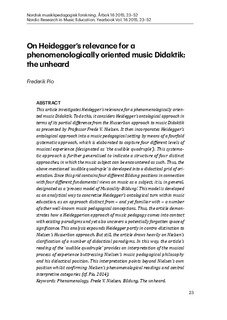| dc.description.abstract | ABSTRACT
This article investigates Heidegger’s relevance for a phenomenologically oriented music Didaktik. To do this, it considers Heidegger’s ontological approach in terms of its partial difference from the Husserlian approach to music Didaktik as presented by Professor Frede V. Nielsen. It then incorporates Heidegger’s ontological approach into a music pedagogical setting by means of a fourfold systematic approach, which is elaborated to capture four different levels of musical experience (designated as ‘the audible quadruple’). This systematic approach is further generalised to indicate a structure of four distinct approaches, in which the music subject can be encountered as such. Thus, the above-mentioned ‘audible quadruple’ is developed into a didactical grid of orientation. Since this grid contains four different Bildung positions in connection with four different fundamental views on music as a subject, it is, in general, designated as a ‘process model of Musicality-Bildung’. This model is developed as an analytical way to concretise Heidegger’s ontological turn within music education, as an approach distinct from – and yet familiar with – a number of other well-known music pedagogical conceptions. Thus, the article demonstrates how a Heideggerian approach of music pedagogy comes into contact with existing paradigms and yet also uncovers a potentially forgotten space of significance. This analysis expounds Heidegger partly in contra-distinction to Nielsen’s Husserlian approach. But still, the article draws heavily on Nielsen’s clarification of a number of didactical paradigms. In this way, the article’s reading of the ‘audible quadruple’ provides an interpretation of the musical process of experience buttressing Nielsen’s music pedagogical philosophy and his didactical position. This interpretation points beyond Nielsen’s own position whilst confirming Nielsen’s phenomenological readings and central
interpretive categories (cf. Pio, 2014).
Keywords: Phenomenology, Frede V. Nielsen, Bildung, The unheard. | nb_NO |
